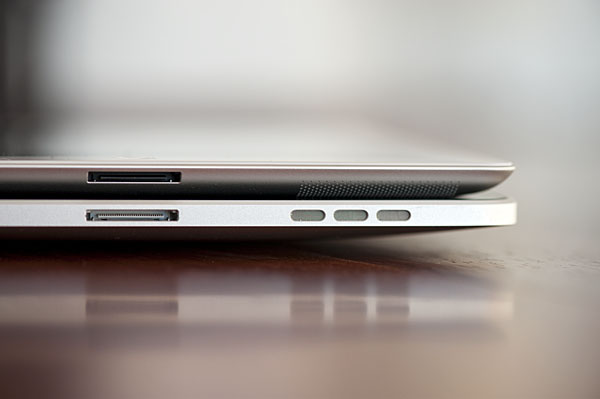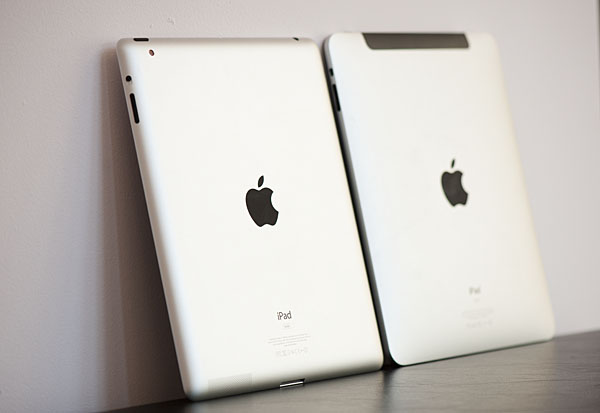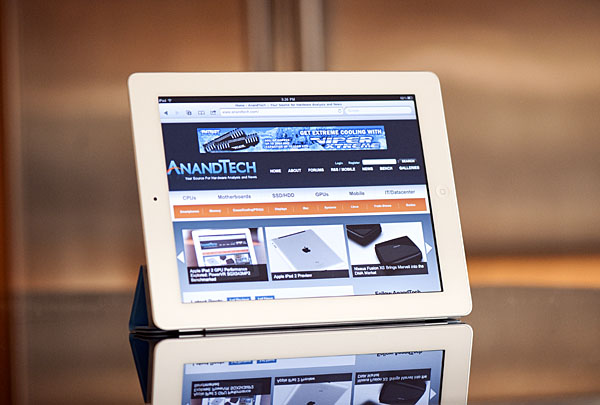The Apple iPad 2 Review
by Brian Klug, Anand Lal Shimpi & Vivek Gowri on March 19, 2011 8:01 PM ESTIndustrial Design & The Future
The original iPad was a device followed by so much hype and anticipation that inevitably, upon launch, it became one of the most polarizing products to launch in the last few years. It also became a huge hit, infusing life into the previously flatlining tablet market, and that's where the iPad 2 comes in.
The industrial design changes are very much in line with what we saw with the 4th generation Apple handhelds. The design language used for the iPhone 3G/3G-S and iPod touch 2G/3G was based on accelerating curvature continuity (known as G3 continuity in industrial design terminology), in contrast to the tangentially continuous design (G1 continuity) found on the original iPhone. What this meant, basically, is that the first iPhone had a relatively flat design, whereas the 3G/3G-S had a gently crowned back that aimed to fit the contour of one's hand.
The original iPad foretold the future of Apple's design language, using a similarly curved back but dumping the blended G3 curvature on the sides for hard edges that met the front face in a perpendicular manner. The iPhone 4 went a step further, with a flat back in addition to the sides. The front profile kept the same rounded corners that every other Apple device has, but the top and side cross-sections end up being rectangles, with all four faces meeting perpendicularly. I'm thinking Apple chose to do this to accomplish two things: being able to use glass for both the front and back faces, as well as to give the iPhone line some separation from the iPod and iPad lines.
The fourth generation iPod touch reaffirmed the notion that Apple was moving back to flatter, more rectangular designs. The use of aluminum instead of glass meant that there wasn't a need for a completely flat back; the predominantly flat back of the iPod tapers to meet the front face at the edges using a short continuous curve.
After seeing the newest iPod touch, I guessed that the second generation iPad would carry rather similar lines. I definitely didn't expect the iPad 2 to be so thin, but overall, it was pretty much in line with what I was expecting.
Another significant aspect to the industrial design changes is the addition of a white-bezeled iPad. The back of both black and white models are the usual anodized aluminum, though the texture of the anodizing on the iPad 2 (as well as the latest MacBook Pros) seems to be a different, smoother one than on previous aluminum Apple devices. Apple seemed to have moved to black bezels on almost all of its products, other than the vaporware-esque white iPhone 4, but between the iPad 2 shipping in white and a promised spring release for the white iPhone 4, it shows that Apple is trending back towards white devices.
The interesting question to ask here is how much we can read into Apple's future designs given the iPad 2, and unfortunately, that isn't a whole lot. It's always difficult to tell with Apple, but it wouldn't surprise me if the iPhone 5 ended up using a very similar design to the iPhone 4. Since the antenna problem is mostly solved (see the antenna diversity on the Verizon iPhone 4), Apple probably doesn't need to do a whole lot to the design for the next generation iPhone. Other than the signal attenuation issues, the iPhone 4 was an amazing piece of hardware, one that Apple spent a lot of money developing. It doesn't make sense for them to turn around and dump it on another ground-up redesign, especially when the 4 is still very competitive from a hardware standpoint. And at this point, I doubt they would focus so much on releasing the white iPhone in spring if they weren't planning on using a very similar chassis for the iPhone 5 that should launch in June.
Given past history, if the iPhone doesn't get a redesign, neither will the iPod touch. Both of the generation 5 handhelds will probably get some form of the A5 SoC, potentially underclocked like the A4 in the iPhone 4. What is more difficult to predict is the 3rd generation iPad. Since we don't really have an established cadence for the iPad, it's hard to say anything about the iPad 3 without reading too much into the iPad 2 launch. I'd say its safe to assume there will be a 6th generation Apple SoC (presumably named the A6), and if I was a betting man, my money would be on at least some form of redesign or at least an ID refresh, but again, with Apple, you really never know.













189 Comments
View All Comments
FrederickL - Saturday, March 19, 2011 - link
I have to say that I largely agree even though I perhaps would not use PrinceGaz' somewhat "undiplomatic" description of the iPad's current customer profile! However, I am obliged to agree that tablets of this size are of little interest (IMO) until they are functional enough that they can _replace_ ones laptop. The case for buying an iPad (fine piece of content consumption kit as it is) falls down at that first fence as far as I am concerned. In general terms my mobile device needs are met by my Desire Z. A third or fourth generation10 - 11 inch tab with a full slide out qwerty (either Honeycomb or Win 8 ARM, the iOS is not to my taste) with more connection/plug options than you can shake stick at, with a docking station+large screen at home - now THAT would open my wallet!
dhuhtala - Sunday, March 20, 2011 - link
I tend to agree - I've always carried a Blackberry phone instead of an iPhone just because it has a slide-out keyboard...I will not compromise on that! This makes the device really practical and I use it a lot.That's why I'm closely watching the ASUS eee Slider - a tablet with a slide out keyboard - that sounds like it will be much cheaper than the Xoom (rumour has it at $500.
The Tegra 2 probably won't meet my requirements for playing MKV video files though, from what I've gathered...
http://www.reghardware.com/2011/03/15/preview_tabl...
solipsism - Sunday, March 20, 2011 - link
You’re the minority. The majority of buyers just want something that works, which is why the techtarded people of the world are jumping into simpler devices for email and browsing, not building their own PCs and running a home-brew version of Linux.synaesthetic - Sunday, March 20, 2011 - link
A netbook can check email and browse the internet for significantly less money. Most people I know, even the techtarded as you so colorfully put it, realize this and do not buy an iPad.The people I know who buy iPads are college students who get Mommy and Daddy to pay for it, and hipsters.
doobydoo - Sunday, March 20, 2011 - link
I couldn't disagree more.I would say that technically savvy people are the ones who are MORE likely to buy an iPad.
I say this as a technically savvy person who has not yet bought an iPad, but can see the appeal:
Firstly - the iPad is lighter, thinner, and has better battery life than most netbooks.
Secondly - it's more capable, in that u wont have to wait around for Windows or whatever OS you're using to load, the apps are designed for the platform and the device's capabilities so it's actually quicker. Games, for example, are much nicer to play and to control on an iPad when compared to a netbook.
Thirdly - it's more convenient in certain situations - u dont need to find a table to set it on or put it on ur lap - you can just hold it, such as when standing up or walking along, or where ur sitting at a table with food all over it.
Fourthly - it's touch screen, extremely advantageous in certain situations. For example, the iPad makes a much better presentation device than any netbook can.
It's such blind ignorance of a lot of people on here to assume that it's non-techy people who buy iPads. It's the non-haters, who buy iPads. The people who want to embrace the latest technology and actually see what it's about before dismissing it with some pathetic stereotype.
medi01 - Tuesday, March 22, 2011 - link
It's a "for fun" device, so if you buy it for some thing else, I doubt your "tech savyiness".And for some, not being able to read stuff you've written to your own device, is a show-stopper. Calling this "hate" is silly.
synaesthetic - Sunday, March 20, 2011 - link
It pretty much is a toy, but I really think smartphones are better toys. They're smaller, and you carry your phone anyway, so why not game on it to kill some time between appointments?Rick83 - Saturday, March 19, 2011 - link
I still stick to my 5" tablet (though something slightly larger might work also...but 7" is already too much).That I can carry around all day (when I want to, and keep a separate non-smart phone that does telephone well enough) and yet it is much more useful than the 4" and 3.5" smart phones. I can comfortably hold it with one hand, buttons are nice and big in landscape mode, the dock gives me USB host, there's BT for keyboards as well, dock with hdmi-out, analog video-out...basically it does anything I would ever need, in the ideal portable form factor.
It could do with a marginally better touch screen and build quality, and performance and stability aren't that great, but considering it predated the first iPad by about 6 months, I'm willing to accept the odd quirk. Also, it still works after quite some use over the last 18 months, with no visible battery life issues.
I hope that the mini-tablet form factor will be explored some more in the future, I would be willing to replace my current device with something similar once the warranty has expired...
Oh did I mention that it cost me less than a third of an iPad? (But, no, no flash either ;))
tzhu07 - Saturday, March 19, 2011 - link
I've been trying to figure out a use for the iPad, and the only thing I can think of is that it's good for doing really simple things and taking notes. Also, when you take it out in front of a client during a lunch meeting, it tends to impress them.But, yeah, I find that there isn't really a need for a device that bridges the gap between a laptop and a smartphone....yet.
vision33r - Saturday, March 19, 2011 - link
It's all about the Apps, regardless which OS they are useless without apps.The iPad has tons of productivity and enterprise ready apps. Would like to see an iMovie clone on Android or some quality productivity apps. So far only iOS has the most real apps.